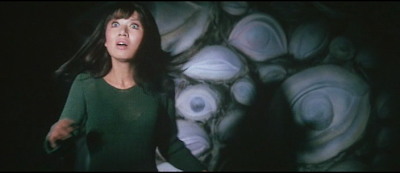Another one from Masumura. And Blind Beast is definitely the most crazy and fucked up, but also the sexiest of the bunch I have seen so far. Upon viewing all these films, it becomes increasingly clear to me why Masumura has been such an influence on the Japanese New Wave and beyond. His films continue to be important even today, as Blind Beast contains quiet a few elements (from the haunting symphony-like score to the possessed characters who roam about dark sets) that Chang-Wok Park, for example, rehashed profusely in his own cinema.
Michio, a blind masseur and sculptor, kidnaps the beautiful model Aki and brings her to his studio. He has converted the space into a sort of shrine dedicated to the senses. Giant replica of different body parts (eyes, ears, mouths, hands, legs, female breasts, etc) adorn the walls. And in the middle of the room, there are two giant sculptures of female bodies (resembling the oversized woman in one of the dream sequences in Almodovar's Hable Con Ela). Michio wants to make a sculpture of Aki that is supposed to be his ultimate masterpiece, thus inventing a new art form, the art of the senses, an art from a blind man for blind men. And what begins as a simple kidnapping story degenerates fairly quickly into a wired S&M-love story that ends with both of the main characters heading to certain death (although Masumura's camera is quiet ambiguous whether Michio and Aki are really dead at the end of the film).
The script has many, many problems, one of them being that it's thematically all over the place, but it seems to me that Blind Beast can be read as a very fierce critique of love. As Michio chases after Aki in his studio and they both climb the giant female bodies while eyes and ears observe them from the walls, I couldn't help but think that this sequence in particular addressed how tedious flirtations can be in a world where gender roles are still pretty much engraved in stone, every move of men and women is observed and judged by society, the whole spiel being dominated by women's sexuality and whether or not men can find access to it. The script then focuses on Michio's loneliness as a blind man and virgin. And in order to give us the spectacular finale, the script goes on to spend quiet some time on how our main protagonists finally hook up for real. But once they do, Masumura goes completely nuts.
The couple engages in what seems to be days of a time of constant touching and love making until one day Aki goes blind as well. The overly literal metaphor that love makes blind is followed by a long descent of Michio and Aki into utter madness, as they begin to hurt each other by biting or cutting because the simple act of love making is not enough for them anymore. Here, Masumura seems to offer that love not only robs us of objectiveness (at the beginning of the film, Michio gives a long speech about how sight is the most superior of the senses) but acts ultimately like a drug. It numbs all of our senses and forces us to act foolishly in order to feel alive. Maybe here, hurting someone else by cutting into his thigh to feel alive can be equated with committing adultery in order to escape the routine of a relationship. In any case, the couple begins to suck each other's blood. Here, Masumura gets obvious again: by numbing our senses, love literally sucks the life out of us. It is only logic then, that Aki demands of Michio at the end that he cuts her in pieces in a final act of sado-masochism. The moment where she feels most alive is the moment she will die and maybe, in a more functional relationship, this would be the instant she leaves her lover to go on with her own life. After Michio does as told, he throws himself into the blade and collapses on top of Aki's body.
Certainly not Masumura's best film, not by a long stretch, but a very memorable one. I am not sure if there actually is a common theme here but a second viewing should bring more clarity.
Shroud Control
5 hours ago

































